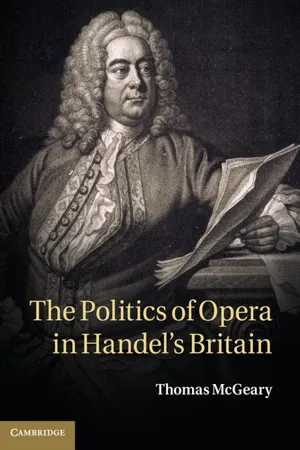
- English
- PDF
- Available on iOS & Android
The Politics of Opera in Handel's Britain
About this book
The Politics of Opera in Handel's Britain examines the involvement of Italian opera in British partisan politics in the first half of the eighteenth century, which saw Sir Robert Walpole's rise to power and George Frideric Handel's greatest period of opera production. McGeary argues that the conventional way of applying Italian opera to contemporary political events and persons by means of allegory and allusion in individual operas is mistaken; nor did partisan politics intrude into the management of the Royal Academy of Music and the Opera of the Nobility. This book shows instead how Senesino, Faustina, Cuzzoni and events at the Haymarket Theatre were used in political allegories in satirical essays directed against the Walpole ministry. Since most operas were based on ancient historical events, the librettos - like traditional histories - could be sources of examples of vice, virtue, and political precepts and wisdom that could be applied to contemporary politics.
Frequently asked questions
- Essential is ideal for learners and professionals who enjoy exploring a wide range of subjects. Access the Essential Library with 800,000+ trusted titles and best-sellers across business, personal growth, and the humanities. Includes unlimited reading time and Standard Read Aloud voice.
- Complete: Perfect for advanced learners and researchers needing full, unrestricted access. Unlock 1.4M+ books across hundreds of subjects, including academic and specialized titles. The Complete Plan also includes advanced features like Premium Read Aloud and Research Assistant.
Please note we cannot support devices running on iOS 13 and Android 7 or earlier. Learn more about using the app.
Information
Table of contents
- Cover
- The Politics of Opera in Handel’s Britain
- Title
- Copyright
- Contents
- Figures
- Tables
- Preface
- Notes on sources
- 1 Introduction
- 2 Opera and political allegory
- 3 Politics in the Royal Academy of Music
- 4 The opera house, allegory, and the political opposition
- 5 Handel’s Second Academy
- 6 Rival opera companies and Farinelli in Madrid
- 7 Politics, theater, and opera in the 1730s
- 8 The opera stage as political history
- Epilogue
- Appendix 1: Political affiliation and principaloffices of shareholders of the Royal Academyof Music, c.1717–22
- Appendix 2: Operas premiered at the RoyalAcademy of Music
- Appendix 3: Directors of the Opera of theNobility with political allegiances in June 1733
- Appendix 4: Operas (and other works)premiered by the Opera of the Nobility
- Appendix 5: Hanoverian celebratory pieces
- Notes
- Select bibliography
- Index